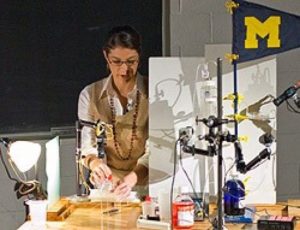 Physics is a fundamental science and provides the foundations for solving both cosmic mysteries and practical problems. In 1995, the University of Michigan Department of Physics began sharing some of the latest ideas in the field with the public in the Saturday Morning Physics lecture series. Designed for general audiences, the lectures are an opportunity to hear physicists discuss their work in easy-to-understand, non-technical terms. The multimedia presentations include hands-on demonstrations of the principles discussed, along with slides, video, and computer simulations.
Physics is a fundamental science and provides the foundations for solving both cosmic mysteries and practical problems. In 1995, the University of Michigan Department of Physics began sharing some of the latest ideas in the field with the public in the Saturday Morning Physics lecture series. Designed for general audiences, the lectures are an opportunity to hear physicists discuss their work in easy-to-understand, non-technical terms. The multimedia presentations include hands-on demonstrations of the principles discussed, along with slides, video, and computer simulations.
Saturday Morning Physics Fall 2018 Schedule:
| Event | Date | Time | Location |
Opening Up the Solar System and Beyond: The Promise of Space Nuclear Power and PropulsionJohn Foster, Professor (U-M Nuclear Engineering and Radiological Sciences) Part of the 50th Anniversary Live Presentation of Stanley Kubrick’s 2001: A Space Odyssey Co-Presentation with: UMS and the College of Engineering We survey propulsion technologies that can enable reduced trip times for robotic and human missions alike beyond Mars, opening up the full solar system to in depth exploration and eventual colonization. Enabling these advances is the utilization of the power of the nucleus-nuclear energy. |
Saturday, September 22, 2018 |
Dark MattersAaron Pierce, Professor and Director, Leinweber Center for Theoretical Physics (U-M Physics) This talk will give an update on the hunt for dark matter and the quest to understand how most of the matter in our universe came about. |
Saturday, September 29, 2018 |
Gravitational Waves with LIGO: Beyond the Big ChirpAnsel Neunzert, Ph.D. Candidate (U-M Physics Gravitational Wave Group) Collecting a zoo of black holes. Hunting for elusive signals from spinning neutron stars. Grappling with terabytes of data. On occasion, imitating thirsty ravens. These are just a few of the things that LIGO scientists are busy with, as the field of gravitational wave physics takes off from its historic first detection. This talk will provide a view of LIGO from the ground: key concepts, recent results, a taste of challenges large and small, and a particular focus on the work done here at University of Michigan. |
Saturday, October 6, 2018 |
Bringing the Stars Down to Earth with the Most Powerful Particle Accelerator in the WorldArtemis Spyrou, Associate Professor (Michigan State University Physics – National Superconducting Cyclotron Laboratory) We also celebrate the James Robert Walker Memorial Lecture on this date. The elements we see around us are all forged in the glowing fires of stars. Nuclear energy and nuclear reactions are driving these fires, and the only way to ever understand how they work is by producing the relevant nuclei here on Earth and studying their properties. For this reason, among others, the most powerful particle accelerator in the world, FRIB, is currently under construction in the heart of Michigan. When built, FRIB will finally give us unique access to those nuclei that are responsible for building the whole Universe. |
Saturday, October 20, 2018 |
Living in the Anthropocene: Toward a Resilient Human SocietyBen van der Pluijm, BR Clark Collegiate Professor, Editor-in-Chief of Earth’s Future (U-M Earth & Environmental Sciences and Program in the Environment) Today’s Anthropocene time marks humanity’s domination of Earth’s changing environment. Societal resilience to the impacts of change requires preparation and adaptation, and, increasingly, mitigative action. |
Saturday, October 27, 2018 |
Particle Physics BuffetDante Amidei, Professor (U-M Physics) Recent news, eternal questions, and current conundrums in particle physics. |
Saturday, November 3, 2018 |
The Proton Radius PuzzleWolfgang Lorenzon, Professor (U-M Physics) Until recently, we thought we knew exactly how big the proton is. Now we are not so sure anymore. What has happened and how are we going to solve the puzzle? |
Saturday, November 10, 2018 |
Wrinkles, Crumples, and Origami: The Physics and Geometry of Thin Elastic SheetsIan Tobasco (Assistant Professor and James Van Loo Post-Doctoral Fellow (U-M Mathematics) On this date we celebrate the Van Loo Family SMP Lecture. The world is full of pattern forming thin elastic sheets, from organic ones like leaves and flowers to inorganic membranes manufactured in the lab. What are the limits of such biologically-inspired design? |
Saturday, November 17, 2018 |

